Irkutsk
Essay about Irkutsk
“Irkutsk has many events to remember and gives much from its own history to the descendants…”
V. Rasputin
“…As England created London, France- Paris, Siberia created Irkutsk. Siberia is proud of Irkutsk, and “not see this city” means “not to see Siberia”.
N. Schelgunov
“Irkutsk is a historical city”. It plays a remarkable role in the history of Russia and in our days history, it is not accidentally ascribed to the city-museums, because it preserves a lot of old buildings, romantic look of non-fussy dignified construction, shine of church cupolas over blue boiling of Angara. Its streets – as a cut of time, where you can see the layers of the past centuries, changing each other”. M.Sergeev, city worshiper and a friend, Honorary citizen, famous writer and a poet, started his story about Irkutsk in his book “Irkutsk” with these words.
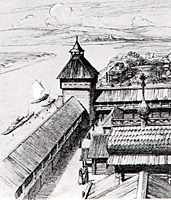
The “ostrog” – a wooden fortress was founded in 1661 by Yakov Pohabov Cossacks on the place of the junction of two rivers: impetuous Angara and gratified Irkut. The city took its name after the river. In 1675 the first ambassador Nikolai Spafarii was passing through the city to China. That is what he wrote in his notes: “Irkutsk “ostrog” is very good as the construction, there are more than 40 Cossacks yards, the place is very profitable”. Picturesque Siberian spaces, blessed earth, forests and rivers, the proximity to the places of Siberian peoples inhabitance– Buryats, Evenks and others contributed to the fast development of Irkutsk fortress. In 1682 it became the center of a regional unit, in the same year the first "voevoda" (military chief) Ivan Vlasiev came here from Moscow. In 1686 Irkutsk received the city status, and some years later it got its city coat of arms.
By the end of the XVII century Irkutsk was a small town, the monasteries were being built, the suburbs and agricultural settlements were being formed.
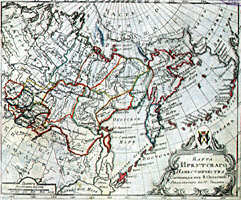
Since the XVIII century in Irkutsk the trades and crafts began to develop, the golden and silver craftsmen, smiths appeared. In relation with the expansion of Russian state to the East from Irkutsk, the city became a capital of enormous territories from the Enisey to the Pacific, it played an important role in the exploration and securing vast Eastern-Siberian and Far-Eastern territories to Russia. Gradually Irkutsk gained more meaning as the main transportation and trade center of Eastern Siberia, it became a center of trade routes from Kamchatka, Chukotka to Yakutia, Mongolia, and China. The administrative meaning of the city increased: it became a center of one fifth of the provinces of Siberia; in 1764 it became a center of independent province.
The XVIII century, in the history of Irkutsk, was a century of the research expeditions. In Irkutsk first and second expeditions of Vitus Bering to the shores of Kamchatka were organized.
The merchant class formed in a city. In the second half of the XVIII century Irkutsk industrial and merchant companies of Golikov, Trapeznikov, Bechevin, Milinikov, Sibirakov began to explore the Aleutian Islands and later Alaska. In 1799 the merchant companies were united in Russian- American company “for the trades on the territory of the Aleutian and Kuril islands and the rest part of North-Eastern sea, belonging to Russia by the right of discovery.” Grigorii Ivanovich Shelikhov, an outstanding seafarer, played an important role in mastering enormous spaces of northern part of Pacific ocean. He was called “Russian Columbus”, he founded first colonies of Russian America.
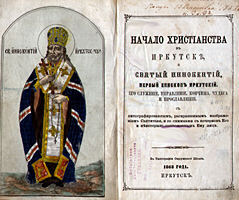
In 1727 the Irkutsk Eparchy was founded.
During the XVIII century educational school, professional-technical education, science, museums, library, theater, book-printing were developed in Irkutsk. Educational and cultural organizations were opened. In 1725 first school in Eastern Siberia, attached to Voznesenskii monastery, was opened, in 1754 – sea (navigation) school and secondary schools were opened. The 1780s were marked by the opening of the second public library among province towns in Russia, regional museum and an amateur theater. In Irkutsk outstanding representatives appeared, still remembered by the people. These were an architect, geographer, historian A.I.Losev, a writer I.T.Kalashnikov, a teacher S.S.Schukin. Siberian science was created. A.G.Laxman, Lomonosov’s apprentice, one of the first Siberian mineralogist, worked in Irkutsk.
The city landscape was changing. The Spassky church, the oldest stone building of Eastern Siberia, unique Krestovozdvizhenskaya church, “Prikaznaya izba” (order house), first stone construction, and the Triumph gate were built.
In the late XVIII century – the early XIX century Irkutsk was gradually increasing its meaning as a trade, craft, cultural city. It became the center of trade with China and since 1830-ths – a gold-manufacturing center of Eastern Siberia and. In 1803 Irkutsk became a center of Siberian general-governor unit, and in 1822 it became a center of Eastern Siberian general – governor unit. General- governors of Eastern Siberia influenced on the city fate greatly.
Irkutsk merchants explored the Eniseisky and Leno-Vitimskii golden regions, they substantially increased their capitals, they became the richest merchants in Siberia. Irkutsk merchant class began to play remarkable role in a city development. Intensive city construction was being undertaken. Private residences, hospitals, orphanages, educational schools were built, significant funds were spent on education and the development of science.
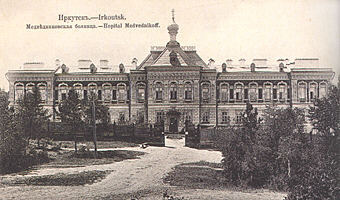
For example, the Maiden institute buildings (1861), educational houses, done in the Roman style, professional school were built. An architectural look of the city was being changed. The White House, done in Russian classic style, Moscow Triumphal Gates – outstanding monument of the XIX century, were built in the honor of the 10th anniversary since the day of the beginning of Alexander I rule.
In the second half of the XIX century the book printing appeared in Irkutsk, first newspapers “Irkutsk province news”, “Amur” were released. The names of A.P.Schapov, M.B.Zagoskin, V.I.Vagin were connected with the newspaper “Siberia”. In 1851 first scientific organization of Eastern Siberia – the Siberian branch of Russian geographical society, was opened. In 1877 it was called Eastern-Siberian branch. V.I.Dybovskii, A.L.Chekanovskii, I.D.Cherskii, V.A.Obruchev, a geologist, geographer and researcher of Siberia, worked in Irkutsk on exploring Baikal and Lena.
The 1879 summer could be considered to be a dramatic period in city history. In the 22-24th of July fire of the almost all central part of the city was burnt, more than the two thirds of city constructions and 75 city districts were destroyed.
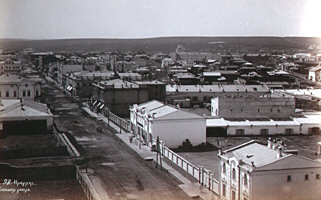
The city began to revive, getting a new look. Stone and wooden constructions built after the fire have been preserved up to present days.
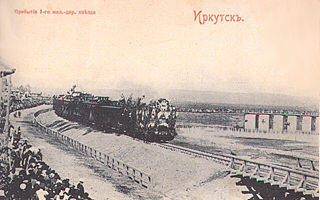
The arrival of the first train via the Trans Siberian main line to Irkutsk in 1898 could be marked as the most remarkable event in the late XIX century. The construction of Great Siberian main line contributed to the further city development.
The lives of the politically exiled were connected with Irkutsk city. First exiled, who lived in Irkutsk for more than 3 months, was A.N. Radischev. Since the 1830s the Decembrists lived in settlements and in the colonies near Irkutsk. Volkonskii and Trubetskoy’ houses became house-museums at the present time. N.A.Panov, I.V.Podzhio, A.Z.Muraviev, P.A.Muhanov, A.P.Yushnevsky, V.A.Bechasnov, the wife of Trubetskoy and their children stayed in Irkutsk land forever. In the late 1850s the Petrashevtzy appeared in Irkutsk. The exiled historian-democrat, A.P.Schapov, lived here till his last days, the Polish rebels and revolutionaries (including “narodniki”) lived here as well.
A well-known Russian publicist of the XIX century, N. Shelgunov, wrote about Irkutsk: “Irkutsk is the only Siberian city, which has the city character. ...As England created London, France - Paris, Siberia – created Irkutsk. Siberia is proud of Irkutsk, “not see this city” means “not to see Siberia”.
In the early XIX century the city was considerably changed, especially its center. Large building were being built, mason streets were being made, cab drivers and night light appeared. The water-supply and first electrification stations began to work. The Irkutsk Regional museum with stamped last names of famous researches of Siberia on its walls (1883), the building of the first public community, city theater (1897), Kazan' cathedral, made in new Byzantine style(1893), and the Roman-Catholic cathedral (1895) completed an architectural style of the city. In 1908 a monument to Alexander III was opened on a picturesque place of Angara embankment.
The city was damaged and influenced by the political events of the XX century – the Russian revolution, the 1917 October revolution, the Civil war and the Great Patriotic War.
Since the 1930s industrial construction of the city has begun. Mechanical engineering plants, the air plant, brick and concrete plants, tea fabric, plants of food industry were being built. Economic development of the city contributed to scientific, educational and cultural development. The first-born of the Higher education in Eastern Siberia, Irkutsk State University was founded in 1918. Its departments were developing as independent institutes: medical, pedagogical, finance-economical. In 1930 the metallurgic institute was opened, in 1934 agricultural institute was organized.
Since the 1950s a fast development of Irkutsk city began after the Great Patriotic War, modern industrious look of a city was being built up. In 1947 streetcar routes were opened in the city, trolleybus routes in 1972. In 1958 a TV center was established. The city large district and micro regions construction period began. New districts such as Baikalskii, Solnechnii, Ubileinii, Primorskii, Akademgorodok and others were growing up.
The historical literature of Irkutsk is fairly extensive. An essay “The historiography of Irkutsk city” by A.B.Dulov, presenting a review of historical literature about our city, will be helpful to all specialists and researchers of city history. The review is a first special work on this subject and was published for the first time.
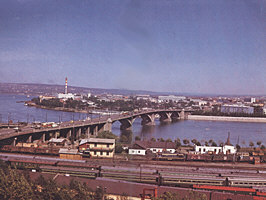
Modern Irkutsk is a large industrial, scientific, educational and cultural center of Russia.
The more than three centuries long path, passed by the city left has marked on the city construction, its planning and architecture. Irkutsk has preserved its original look, combining shine of church domes, beauty of merchants’ houses, monumentality of modern buildings and constructions. More than 1200 historical, architectural, cultural monuments, historically composed monuments are distinguished among them, have been preserved.
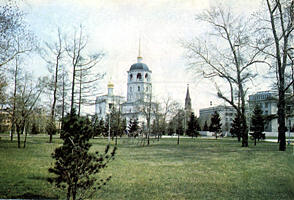
Irkutsk is an administrative center of the region.
Irkutsk is situated on three rivers: Angara, Irkut, Ushakovka in 66 km to the west from the Sacred lake Baikal, a grand creation of the Universe. The climate is severe. Though non-freezing Angara, winds from Zabaikalia and cyclones soften winter frost. Irkutsk is one of Russian cities where the number of sunny hours exceeds 2000. Vegetative meadows, pine forests are spread out around Irkutsk, there are many forest parks within a city.
The population of Irkutsk is about 600,000 people.
The city consists of 5 districts. The Kirovskii district is a historical and modern center of Irkutsk. Almost all administrative buildings, theaters, museums, libraries are located here. The territory of the Kuibishevskii district is the oldest industrial part of Irkutsk, called as “Rabochee” suburb. The Oktyabriskii district is modern Irkutsk. The Sverdlovskii district is a district of science and education. There are Irkutsk hydroelectric station, Studgorodok, Lenin’ district – large railway center of the Eastern Siberian railway on the territory of the Sverdlovskii district.
The Irkutsk industry is represented as a united regional complex by such branches as energy, food industry, building materials industry, airplane building, ship and aviation repair industry.
Irkutsk, located in the center of Eastern Siberia, is a modern trade center, large transportation center on the Trans Siberian railway. Irkutsk airport delivers passengers from Moscow to Vladivostok, to international airports of China, Japan and other countries.
Siberian region is one of the largest source of energy. The construction of the energy-industrial center has begun with the building of hydroelectric station on the Angara river.
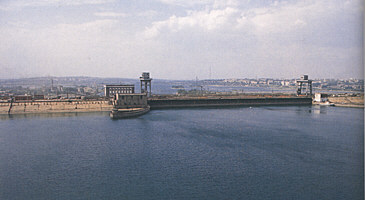
The development of academic science in a city is connected with activity of Irkutsk scientific center (INZ) SO (Siberian Department) RAN (Russian Academy of Sciences), uniting scientific-research institutes, industrial and economical organizations of the SO RAN located in Irkutsk region and partly in other regions of Russia. The center has a unique scientific-research basis. On the territory of Siberia there are many astronomical, geographical and biological stations. Scientific research of the Irkutsk scientists contribute to the development of the Earth Science, to the forming of social-economical potential of Irkutsk region and to all Siberia. Outstanding scientists such as V.V.Zvonkov, E.V.Pavlkovskii, V.A.Krotov, L.A.Melentyev, M.M.Odinzov, V.B.Sochaeva, V.E.Stepanov, N.A.Ligachyev, were the heads of the presidium of INZ SO RAN in different years. At present time the chairman of the Presidium is an Academician G.A. Zherebzov. Academic and branch institutes, high schools help achieve a high level of fundamental and applied researches on math, mechanics, energetic, physic, cosmophysic, chemistry of solid substances, biology and physiology of plants.
46 municipal institutions of public health service function in Irkutsk. A medical center of nontraditional medicine, a center of psychological aid have been established. In 1999 the diagnosis center was opened. In 1987 Eastern-Siberian branch of SO RAN was opened in order to solve all regional problems and coordinate all researches, connected with preserving health of the population of Siberia.
In Irkutsk museums and libraries cultural heritage of Irkutsk region is carefully preserved. In Irkutsk art museum of Sukachev unique collections of history, art and nature have been gathered. Scientific library of Irkutsk state university and Regional Universal Scientific Library of Molchanov-Sibirskii are considered to be keepers of priceless book treasures.
Irkutsk land has raised a lot of talented poets and writers such as I.T.Kalashnikov, N.A.Polevoi, I.Utkin, I.Molchanov-Siberskii, V.Rasputin, A.Vampilov, M.Sergeev and others.
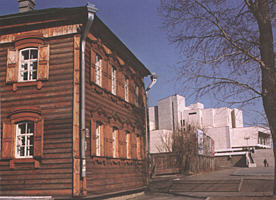
The theater and musical life of Irkutsk is variable. At present time 5 professional theatres work in Irkutsk: Academic drama theater of Okhlopkov, Musical theater, Youth Theater, Regional Puppet Theater, Folk Drama Theater; several amateur groups. The Regional Philarmony offers concerts of chamber, classical and organ music.
Irkutsk is a center of art culture of Siberia. The Irkutsk organization of Russian Artist Union has celebrated its 65th anniversary. Many artists are known outside the region. These are A.I.Vychugzhanin, B.Lebedinskii, A.Alexeev, L.B.Gimov, V.S.Rogal.
Irkutsk is the city of the youth and students, getting a Higher Education in Classical, Pedagogical, Technical, Medical, Linguistical Universities, Economical and Agricultural Academies, 9 Institutes. There are about 30 middle special educational establishments, 10 professional-technical schools and lyceums.
About 50 kinds of sport are developed in Irkutsk. These are bandy, hockey, basketball, track and field athletics, free calisthenics, box, skating, skiing. There are champions and the Olympic Games prize-winners, largest international competitions winners.
There are more than 150 periodicals, published in the city; daily on the air – 4 TV studios and 5 radio stations.
rkutsk is changing… The roads, heating mains, streetcar and trolleybus lines, social and cultural objects are growing. Together with them old buildings, historical and cultural monuments are being restorated.
On the eve of a new millenium, relying on the land support, strengthening its forces, hearing its ancestors and contemporaries’ words, Irkutsk confidently looks at its future.
This is our Irkutsk. But each Irkutsk citizen has his or her own Irkutsk and life and destiny, connected with this city.
"There are taller and more beautiful cities.
But wherever the roads of the Irkutsk townspeople lie, -
They see and hear you,
Dear Irkutsk is the middle of the Earth".
(From a song).




